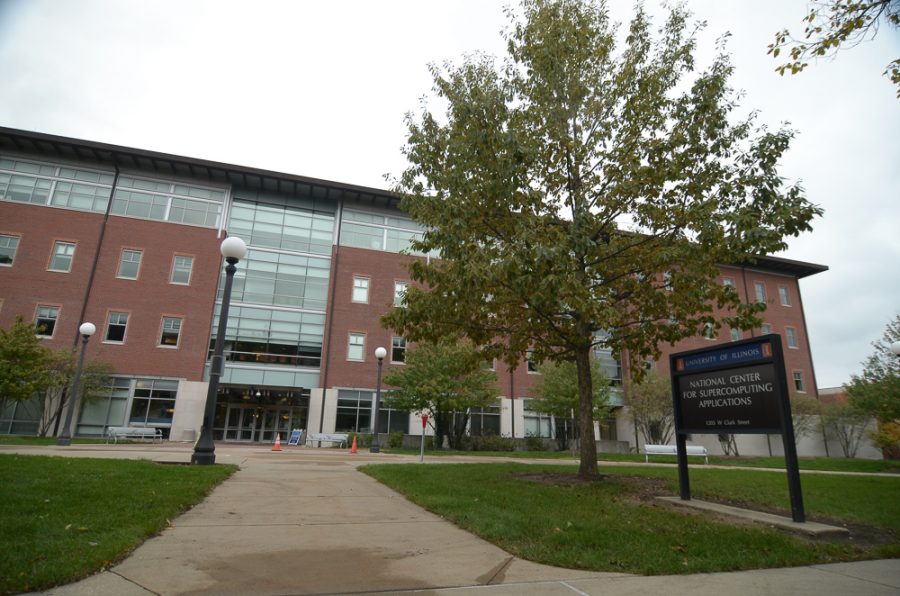University researchers collaborate overseas
The National Center for Supercomputing Applications is located at 1205 W Clark Street in Urbana.
October 31, 2017
The individual research projects of Dr. Matias Carrasco Kind, Liana Acevedo-Siaca and Dr. Cris Hughes span several fields of study but are united in one aspect: production of any meaningful results requires communication in research across geographic and linguistic boundaries.
The work that each of these three researchers conduct is part of a larger group that draws from over 500 institutions and more than 30 universities in the United States, Europe and Australia.
Kind is a research scientist for the University’s Department of Astronomy. He works at the Large Synoptic Survey Telescope developing algorithms for data production, data workflows and data analysis. He also works at the Dark Energy Survey, where he primarily acts as a liaison with the group’s collaborations, according to his website.
He began his higher education in his native Chile, continued his studies in Germany and finally came to the University for his master’s and doctoral degrees.
A conference for the international research team Kind is involved in is held twice a year. During these conferences, representatives from every institution attend to share their progress and collaborate in one room.
Get The Daily Illini in your inbox!
Outside of these conferences, the team uses resources such as telecoms, the instant messaging app Slack and email to communicate and work together to solve problems.
“I mean it’s a very, very organized and friendly collaboration, so we are able to split different tasks among ourselves very easily,” Kind said.
Kind said even though communication through video and email is excellent and reliable, the conferences are invaluable because actually sitting together for more than an hour provides collaboration opportunities.
One commonality among every researcher involved in the team is curiosity about the universe.
Kind said the researchers all feel the same passion about the work, so it becomes a friendly collaboration.
“When somebody makes a discovery or some breakthrough progress then we all get excited about it and talk about it,” Kind said. “I think it’s not really a barrier between us, it’s just a small challenge, but the goal is so so big and so important for all of us that it’s not an issue.”
The relationship between astronomers across the world is strengthened by a combined curiosity, and the need for collaboration to further increase a combined knowledge overcomes any difficulties.
Kind isn’t the only researcher on the team with close international ties. Last year, graduate student in ACES Acevedo-Siaca studied at the International Rice Research Institute in the Philippines, working in global food security. While there, she performed field work to further her research.
This time spent abroad provided Acevedo-Siaca the opportunity to work with a new team of people from a variety of backgrounds and academic concentrations.
“If you have everyone in the same field, I think you really limit the different approaches that you can take to solve a problem, and in this case with a problem like food security, there are so many different aspects to it,” Acevedo-Siaca said.
The greatest barrier Acevedo-Siaca found while studying in the Philippians was the time difference. She expressed the frustration that could happen when an email that sent at 9 a.m. may not be responded to until the next day. This could cause work to be slow, yet the work always managed to be completed.
Today, Acevedo-Siaca works with a research team called Realizing Increased Photosynthetic Efficiency. The team strives to combat work food shortages by increasing crop production. Her focus is on the diversity of traits and genetic variation in photosynthesis for rice.
Working in the states after her time abroad, Acevedo-Siaca finds she is not relying as heavily on international communication. Still, she says working across borders is easier than one might expect.
Similarly to Kind, Acevedo-Siaca participates in annual conferences among fellow researchers from all over the world. She said these meetings are where they get a chance to talk about research progress.
“Everyone comes together and talks about the improvements in their research over the past year, where everything is heading, but it’s also a really great chance for collaboration,” Acevedo-Siaca said.
Acevedo-Siaca said food insecurity is not a localized concern, but one that affects lives all over the world. Every researcher involved wants to address a common goal. They work to overcome struggles that may arise because their task requires a greater concern than any frustration of geography or time.
Hughes’s research, however, often faces greater struggles because of difficulty in confronting language barriers.
Hughes is a professor of anthropology dedicated to investigating the death of migrants on the border between the United States and Mexico. More specifically, she seeks to solve the problem of unidentified migrant bodies and how to connect with families of the dead.
The first issue Hughes faces is that a migrant found dead inside of the United States immediately opens an international investigation. However, many of the resources available do not cater to international investigations.
Websites that serve as databases for missing persons are only in English and, more recently, Spanish. She said websites are also not easily accessible to those who are most often looking for a loved one.
Hughes said an advantage that American universities have is that all of the top journals anyone wants to be a part of are in English.
“So that comes down to who you’re choosing as your collaborators, and the default is that we expect them to speak our language,” Hughes said. “We’re very privileged in that regard … in many other countries, knowing English is directly tied to the success that you’ll be able to have as an academic (and) as a researcher because that’s going to essentially be the quality of your publication.”
Even so, Hughes said her work is too important for a barrier such as a language to stop it.
“Language cannot be a hurdle,” Hughes said.







